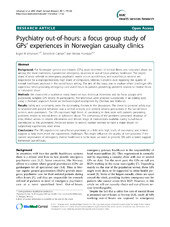| dc.contributor.author | Johansen, Ingrid Hjulstad | en_US |
| dc.contributor.author | Carlsen, Benedicte | en_US |
| dc.contributor.author | Hunskår, Steinar | en_US |
| dc.date.accessioned | 2012-01-23T09:49:52Z | |
| dc.date.available | 2012-01-23T09:49:52Z | |
| dc.date.issued | 2011-05-27 | eng |
| dc.Published | BMC Health Services Research 2011, 11:132 | en |
| dc.identifier.issn | 1472-6963 | |
| dc.identifier.uri | https://hdl.handle.net/1956/5488 | |
| dc.description.abstract | Background: For Norwegian general practitioners (GPs), acute treatment of mental illness and substance abuse are among the most commonly experienced emergency situations in out-of-hours primary healthcare. The largest share of acute referrals to emergency psychiatric wards occurs out-of-hours, and out-of-hours services are responsible for a disproportionately high share of compulsory referrals. Concerns exist regarding the quality of mental healthcare provided in the out-of-hours setting. The aim of this study was to explore which challenges GPs experience when providing emergency care out-of-hours to patients presenting problems related to mental illness or substance abuse. Methods: We conducted a qualitative study based on two individual interviews and six focus groups with purposively sampled GPs (totally 45 participants). The interviews were analysed successively in an editing style, using a thematic approach based on methodological descriptions by Charmaz and Malterud. Results: Safety and uncertainty were the dominating themes in the discussions. The threat to personal safety due to unpredictable patient behaviour was a central concern, and present security precautions in the out-of-hours services were questioned. The GPs expressed high levels of uncertainty in their work with patients presenting problems related to mental illness or substance abuse. The complexity of the problems presented, shortage of time, limited access to reliable information and limited range of interventions available during out-of-hours contributed to this uncertainty. Perceived access to second opinion seemed to have a major impact on subjectively experienced work stress. Conclusions: The GPs experienced out-of-hours psychiatry as a field with high levels of uncertainty and limited support to help them meet the experienced challenges. This might influence the quality of care provided. If the current organisation of emergency mental healthcare is to be kept, we need to provide GPs with a better support framework out-of-hours. | en_US |
| dc.language.iso | eng | eng |
| dc.publisher | BioMed Central | eng |
| dc.relation.ispartof | <a href="http://hdl.handle.net/1956/6954" target="blank">Mental illness out-of-hours. Characteristics and challenges of patient contacts in emergency primary health care in Norway</a> | eng |
| dc.rights | Attribution CC BY | eng |
| dc.rights.uri | http://creativecommons.org/licenses/by/2.0/ | eng |
| dc.title | Psychiatry out-of-hours: a focus group study of GPs’ experiences in Norwegian casualty clinics | en_US |
| dc.type | Peer reviewed | |
| dc.type | Journal article | |
| dc.description.version | publishedVersion | en_US |
| dc.rights.holder | Copyright 2011 Johansen et al; licensee BioMed Central Ltd. | |
| dc.identifier.doi | https://doi.org/10.1186/1472-6963-11-132 | |
| dc.identifier.cristin | 806308 | |
| dc.subject.nsi | VDP::Medical disciplines: 700::Health sciences: 800::Health service and health administration research: 806 | eng |

